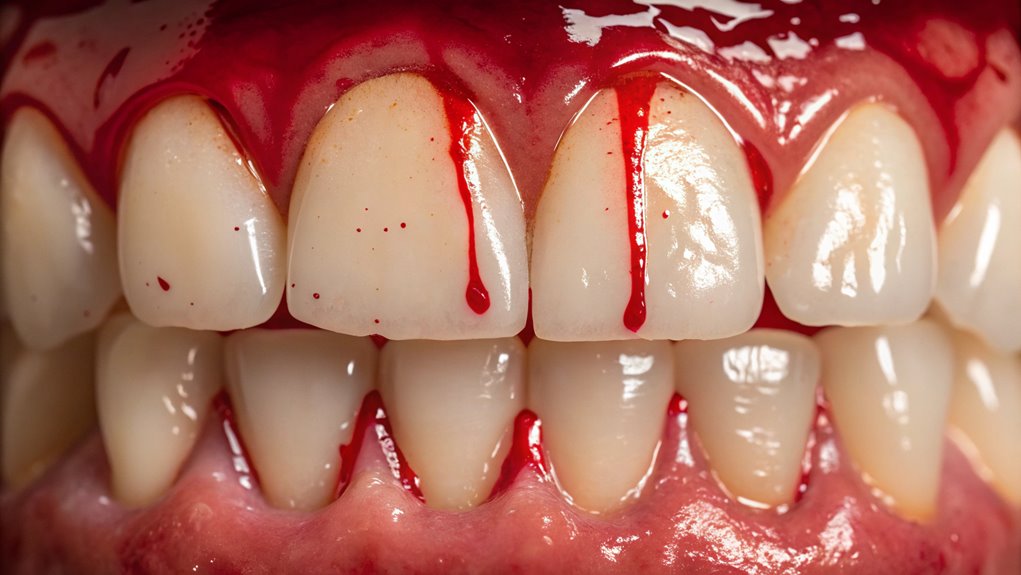Bleeding gums are often an early indicator of gum disease, most commonly gingivitis, which results from plaque accumulation... This condition can be exacerbated by poor oral hygiene, aggressive brushing, and vitamin deficiencies such as vitamins C and K. Hormonal changes and certain medical conditions like diabetes can further contribute to gum sensitivity and bleeding. Effective management involves maintaining a robust oral hygiene routine, using antiseptic mouthwash, and regular dental cleanings. It is crucial to seek professional advice if bleeding persists beyond two weeks, as this may suggest more serious health concerns. Discover more about prevention and treatment options.
Key Takeaways
- Bleeding gums often indicate gum disease, primarily caused by plaque buildup and poor oral hygiene.
- Vitamin deficiencies, particularly C and K, can exacerbate gum bleeding.
- Effective treatment includes regular brushing, flossing, antiseptic mouthwash, and professional dental cleanings.
- Persistent gum bleeding and additional symptoms like swelling or bad breath require immediate professional dental evaluation.
- Prevention involves maintaining good oral hygiene, regular dental check-ups, and healthy lifestyle changes, such as quitting smoking.
Understanding Bleeding Gums
Bleeding gums are a common oral health issue that often serve as an early warning sign of gum disease, such as gingivitis. Gingivitis is characterized by inflammation and irritation of the gums, primarily caused by plaque accumulation. Plaque, a sticky film of bacteria, accumulates on teeth and gums due to inadequate oral hygiene practices. When not effectively removed through regular brushing and flossing, plaque can lead to gum tissue irritation and subsequent bleeding.
Beyond gum disease, bleeding gums may also indicate underlying vitamin deficiencies, particularly of vitamins C and K. These vitamins play an essential role in maintaining healthy gums and proper blood clotting. Deficiencies can exacerbate gum bleeding and inflammation. As a result, maintaining a balanced diet rich in essential nutrients is critical for oral health.
Effective oral hygiene is paramount in preventing and managing bleeding gums. This includes brushing at least twice daily with fluoride toothpaste, flossing regularly, and attending routine dental check-ups. Such practices help control plaque buildup and reduce the risk of gum disease progression. If bleeding persists for more than two weeks, it is important to seek professional dental advice to prevent potential complications and guarantee ideal oral health.
Common Causes of Bleeding
A multitude of factors can contribute to the occurrence of bleeding gums, underscoring the complexity of oral health issues. One of the primary culprits is gingivitis, a gum disease resulting from the accumulation of plaque—a sticky film of bacteria—that irritates the gums and causes inflammation. Without proper oral hygiene, plaque can harden into tartar, exacerbating gum disease and bleeding.
In addition to poor oral hygiene, mechanical factors such as hard brushing or the use of a non-soft toothbrush can damage delicate gum tissue, leading to bleeding and irritation. Hormonal changes during life stages like pregnancy, puberty, or menopause also play a significant role in increasing gum sensitivity, thereby contributing to bleeding.
Nutritional deficiencies, particularly in essential vitamins, especially Vitamin C and K, can weaken gum tissue resilience and integrity, resulting in increased bleeding. Furthermore, certain medical conditions such as diabetes and blood disorders, including hemophilia, can further predispose individuals to gum bleeding by impairing the body's ability to manage infections and effectively clot blood.
Recognizing these common causes of bleeding gums is essential for patients to seek timely professional advice and prevent the progression of oral health complications.
Effective Treatment Options
To effectively manage and treat bleeding gums, it is essential to prioritize and enhance oral hygiene practices. This begins with brushing twice daily and flossing regularly, which are fundamental steps in removing plaque buildup and preventing gum inflammation. Ensuring good oral hygiene can greatly reduce the risk of bleeding from your gums and help maintain overall oral health. Additionally, incorporating an antiseptic mouthwash into your routine can further aid in reducing plaque accumulation and soothing inflamed gums.
Professional dental cleanings play an important role in managing gum health. It is recommended to undergo these cleanings biannually, as they are instrumental in removing tartar that regular brushing and flossing might miss. During these visits, dental care professionals can assess the condition of your gums and offer tailored advice and treatments. In more severe cases of gum disease, procedures such as scaling and root planing may be necessary to address advanced issues and prevent further complications.
Home remedies, like warm saltwater rinses, can also provide temporary relief by reducing swelling and discomfort. However, persistent bleeding from your gums should prompt a consultation with a dental care provider for proper evaluation and intervention.

Prevention Strategies for Healthy Gums
Ensuring ideal oral health begins with the implementation of effective prevention strategies for maintaining healthy gums. A fundamental aspect is adopting a consistent oral hygiene routine. Brushing teeth at least twice daily and using floss or interdental brushes once a day are critical practices to prevent plaque buildup, a primary cause of gum bleeding. Plaque, if not regularly removed, can lead to gum disease such as gingivitis, thereby emphasizing the importance of diligent oral care.
Regular dental check-ups, recommended every six months, play an essential role in professional cleaning and early detection of potential gum issues. These visits considerably reduce the risk of developing gum disease, ensuring any concerns are addressed promptly. Additionally, selecting a soft-bristled toothbrush and utilizing gentle brushing techniques can help minimize gum irritation, preventing bleeding caused by aggressive brushing habits.
Incorporating lifestyle changes also contributes to healthier gums. Quitting smoking and reducing sugar intake are beneficial in lowering the risk of gum disease. Moreover, adding an antibacterial mouthwash to your daily routine can effectively reduce plaque accumulation and inflammation, offering additional protection against bleeding gums. These strategies collectively foster an environment conducive to maintaining ideal gum health.
When to Seek Professional Help
C:\Users\User\Desktop\zimmwriter\output\Bleeding_Gums_0002.jpg
While maintaining healthy gums through preventive measures is fundamental, recognizing when to seek professional help is equally important. Persistent bleeding gums, especially when lasting more than two weeks, can be a warning sign of underlying health issues or the onset of periodontal disease. It is essential to schedule an appointment with a dentist promptly to address these concerns and prevent further complications involving teeth and gums.
Frequent gum bleeding, particularly if accompanied by symptoms such as swelling, bad breath, or loose teeth, necessitates immediate consultation with a dental professional. These signs often point towards more advanced stages of gum disease, requiring specialized treatment. Additionally, if bleeding occurs spontaneously while brushing or flossing without an apparent cause, it is advisable to seek dental evaluation to uncover any hidden issues.
Patients on blood-thinning medications should be vigilant about their gum health, given the increased risk of bleeding. Such individuals should promptly consult their healthcare provider if they notice heightened gum bleeding. Early intervention is imperative; neglecting persistent bleeding can lead to tooth loss and potentially impact systemic health. By addressing bleeding gums promptly, patients can safeguard their oral health and overall well-being.
Frequently Asked Questions
How Do You Get My Gums to Stop Bleeding?
To address persistent bleeding of the gums, implement a thorough oral hygiene routine including regular brushing, flossing, and antiseptic mouthwash use. If symptoms persist beyond two weeks, seek dental consultation to identify and treat potential underlying conditions.
What Is Bleeding Gums a Symptom Of?
Bleeding gums are a symptom of gum disease, such as gingivitis or periodontitis, and may also indicate systemic issues like vitamin deficiencies, hormonal changes, or underlying health conditions. Prompt evaluation and treatment are essential for peak oral health.
What Are 4 Causes of Gum Bleeding?
Four causes of gum bleeding include gingivitis from plaque buildup, periodontitis causing tissue destruction, vitamin deficiencies particularly Vitamin C and K, and hormonal changes during pregnancy or menopause. Addressing these factors can greatly improve oral health outcomes.
Which Deficiency Causes Gum Bleeding?
Vitamin deficiencies, specifically vitamins C and K, are known to cause gum bleeding. Vitamin C deficiency can lead to inflammation and bleeding, while vitamin K deficiency impairs blood clotting, exacerbating the bleeding of gum tissues.
Conclusion
Bleeding gums, a prevalent dental concern, often indicate underlying health issues such as gum disease or nutritional deficiencies. Effective management and prevention require maintaining ideal oral hygiene and regular dental care practices. Persistent bleeding, despite diligent oral care, warrants immediate professional evaluation to identify the cause and initiate appropriate treatment. Early intervention is vital for preventing severe oral and systemic complications. Understanding the causes, implications, and management strategies is essential for ensuring long-term oral health and overall well-being.
